Reflective Journal: Skills Development and Gibbs Model Analysis
VerifiedAdded on 2022/11/25
|8
|1710
|415
Journal and Reflective Writing
AI Summary
This reflective journal explores the importance of skills development and personal development plans in achieving future goals. The journal focuses on the use of Continuous Professional Development (CPD), the Gibbs reflective cycle, and the analysis of past experiences to improve learning and decision-making. The student reflects on various skills developed during a module, including communication, research, ICT, teamwork, time management, and problem-solving. The Gibbs model is applied to analyze a specific situation involving workshops and presentations, detailing feelings, evaluations, conclusions, and potential actions. The journal emphasizes the importance of reflection and CPD for continuous improvement and goal achievement, referencing relevant literature to support the analysis. The conclusion highlights the benefits of reflection and CPD, emphasizing their role in achieving future goals effectively.
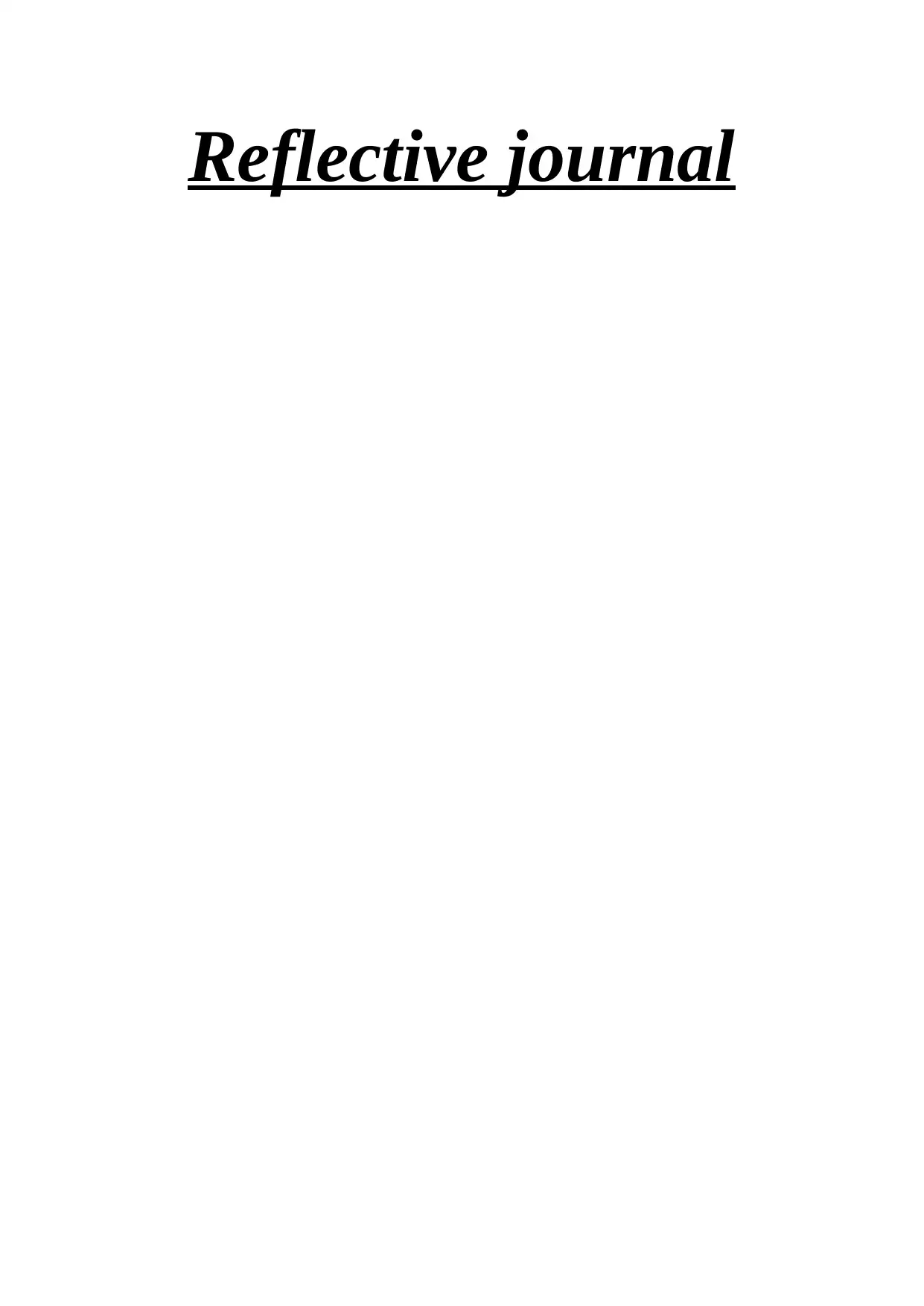
Reflective journal
Paraphrase This Document
Need a fresh take? Get an instant paraphrase of this document with our AI Paraphraser
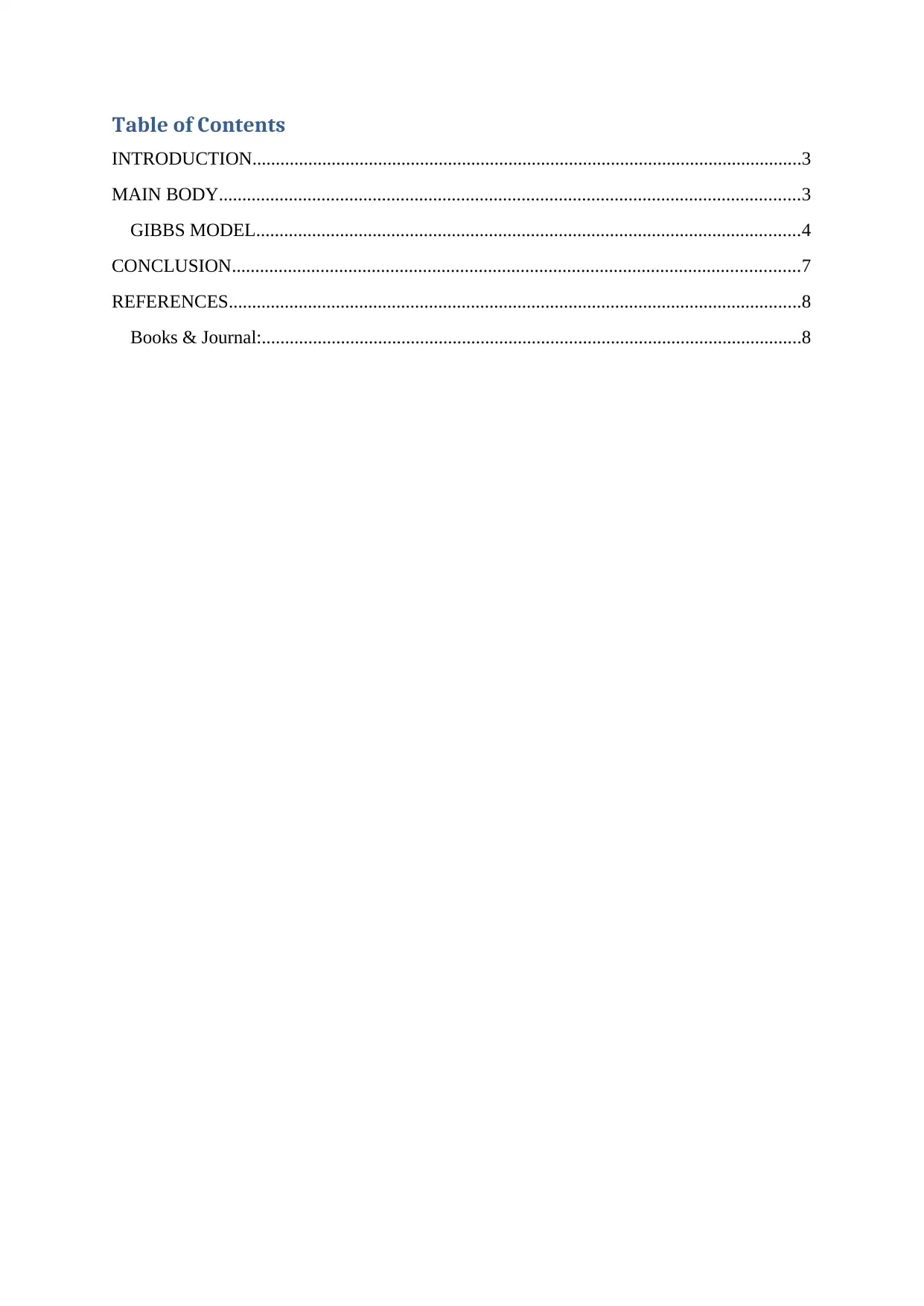
Table of Contents
INTRODUCTION......................................................................................................................3
MAIN BODY.............................................................................................................................3
GIBBS MODEL.....................................................................................................................4
CONCLUSION..........................................................................................................................7
REFERENCES...........................................................................................................................8
Books & Journal:....................................................................................................................8
INTRODUCTION......................................................................................................................3
MAIN BODY.............................................................................................................................3
GIBBS MODEL.....................................................................................................................4
CONCLUSION..........................................................................................................................7
REFERENCES...........................................................................................................................8
Books & Journal:....................................................................................................................8
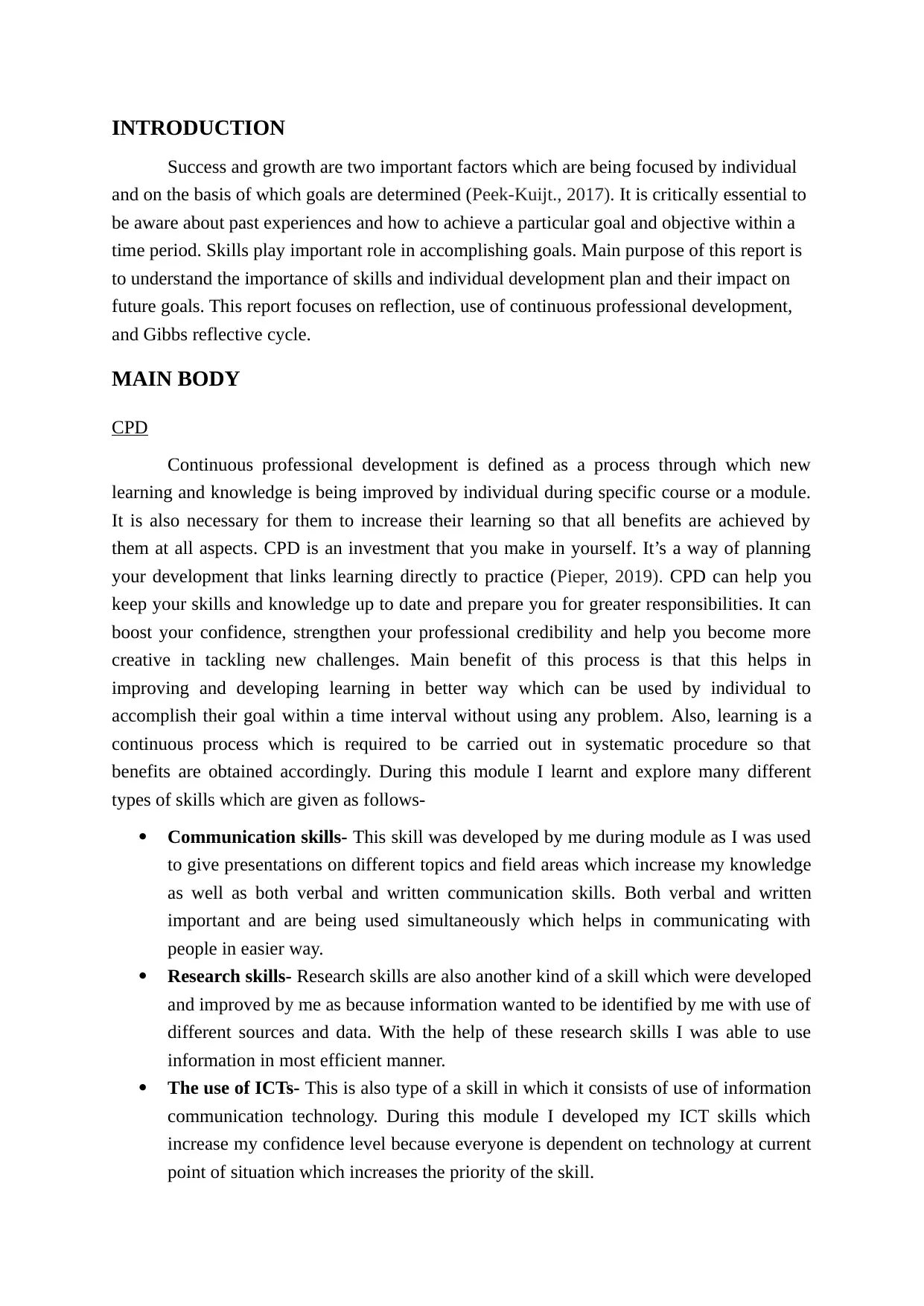
INTRODUCTION
Success and growth are two important factors which are being focused by individual
and on the basis of which goals are determined (Peek-Kuijt., 2017). It is critically essential to
be aware about past experiences and how to achieve a particular goal and objective within a
time period. Skills play important role in accomplishing goals. Main purpose of this report is
to understand the importance of skills and individual development plan and their impact on
future goals. This report focuses on reflection, use of continuous professional development,
and Gibbs reflective cycle.
MAIN BODY
CPD
Continuous professional development is defined as a process through which new
learning and knowledge is being improved by individual during specific course or a module.
It is also necessary for them to increase their learning so that all benefits are achieved by
them at all aspects. CPD is an investment that you make in yourself. It’s a way of planning
your development that links learning directly to practice (Pieper, 2019). CPD can help you
keep your skills and knowledge up to date and prepare you for greater responsibilities. It can
boost your confidence, strengthen your professional credibility and help you become more
creative in tackling new challenges. Main benefit of this process is that this helps in
improving and developing learning in better way which can be used by individual to
accomplish their goal within a time interval without using any problem. Also, learning is a
continuous process which is required to be carried out in systematic procedure so that
benefits are obtained accordingly. During this module I learnt and explore many different
types of skills which are given as follows-
Communication skills- This skill was developed by me during module as I was used
to give presentations on different topics and field areas which increase my knowledge
as well as both verbal and written communication skills. Both verbal and written
important and are being used simultaneously which helps in communicating with
people in easier way.
Research skills- Research skills are also another kind of a skill which were developed
and improved by me as because information wanted to be identified by me with use of
different sources and data. With the help of these research skills I was able to use
information in most efficient manner.
The use of ICTs- This is also type of a skill in which it consists of use of information
communication technology. During this module I developed my ICT skills which
increase my confidence level because everyone is dependent on technology at current
point of situation which increases the priority of the skill.
Success and growth are two important factors which are being focused by individual
and on the basis of which goals are determined (Peek-Kuijt., 2017). It is critically essential to
be aware about past experiences and how to achieve a particular goal and objective within a
time period. Skills play important role in accomplishing goals. Main purpose of this report is
to understand the importance of skills and individual development plan and their impact on
future goals. This report focuses on reflection, use of continuous professional development,
and Gibbs reflective cycle.
MAIN BODY
CPD
Continuous professional development is defined as a process through which new
learning and knowledge is being improved by individual during specific course or a module.
It is also necessary for them to increase their learning so that all benefits are achieved by
them at all aspects. CPD is an investment that you make in yourself. It’s a way of planning
your development that links learning directly to practice (Pieper, 2019). CPD can help you
keep your skills and knowledge up to date and prepare you for greater responsibilities. It can
boost your confidence, strengthen your professional credibility and help you become more
creative in tackling new challenges. Main benefit of this process is that this helps in
improving and developing learning in better way which can be used by individual to
accomplish their goal within a time interval without using any problem. Also, learning is a
continuous process which is required to be carried out in systematic procedure so that
benefits are obtained accordingly. During this module I learnt and explore many different
types of skills which are given as follows-
Communication skills- This skill was developed by me during module as I was used
to give presentations on different topics and field areas which increase my knowledge
as well as both verbal and written communication skills. Both verbal and written
important and are being used simultaneously which helps in communicating with
people in easier way.
Research skills- Research skills are also another kind of a skill which were developed
and improved by me as because information wanted to be identified by me with use of
different sources and data. With the help of these research skills I was able to use
information in most efficient manner.
The use of ICTs- This is also type of a skill in which it consists of use of information
communication technology. During this module I developed my ICT skills which
increase my confidence level because everyone is dependent on technology at current
point of situation which increases the priority of the skill.
⊘ This is a preview!⊘
Do you want full access?
Subscribe today to unlock all pages.

Trusted by 1+ million students worldwide
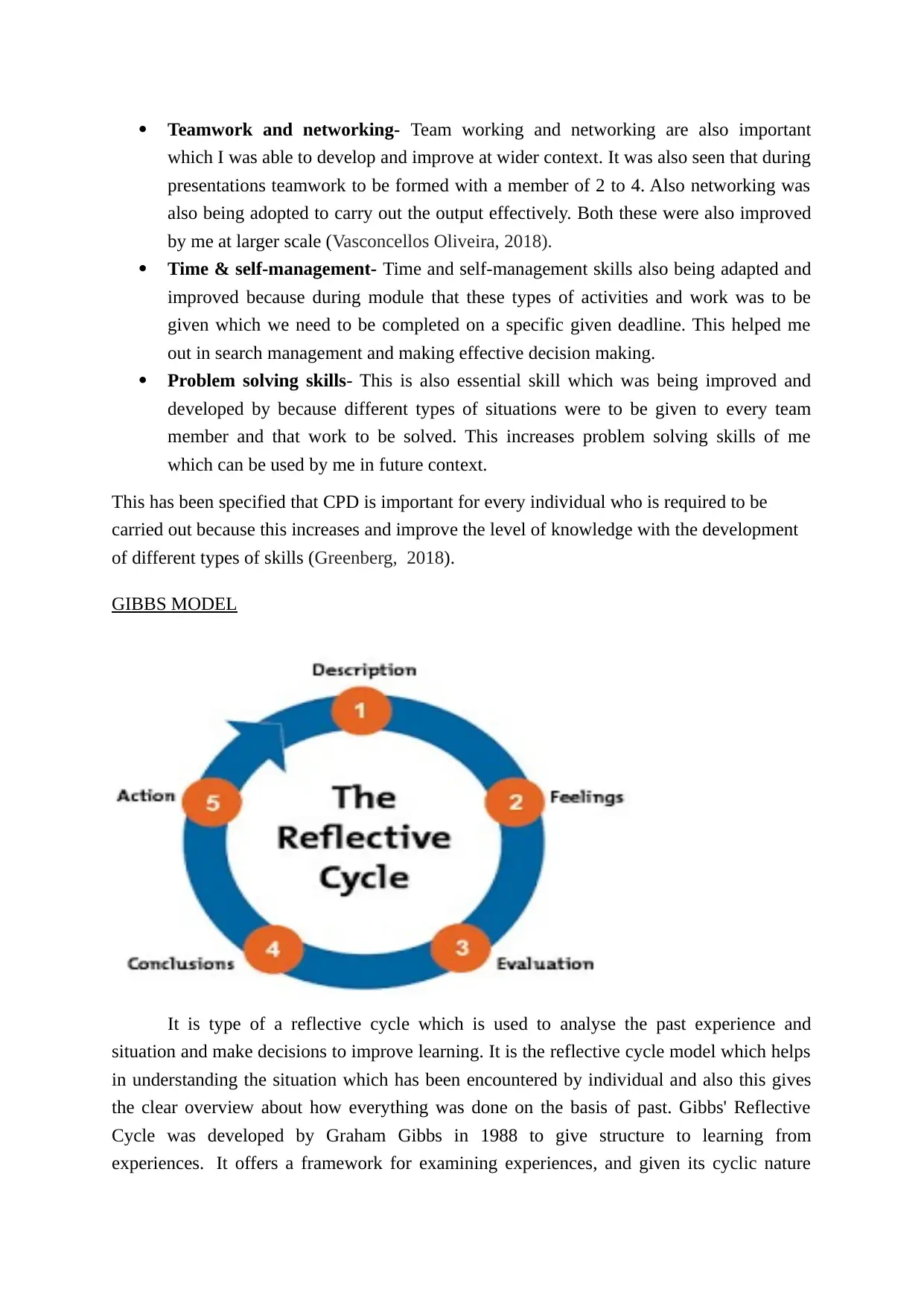
Teamwork and networking- Team working and networking are also important
which I was able to develop and improve at wider context. It was also seen that during
presentations teamwork to be formed with a member of 2 to 4. Also networking was
also being adopted to carry out the output effectively. Both these were also improved
by me at larger scale (Vasconcellos Oliveira, 2018).
Time & self-management- Time and self-management skills also being adapted and
improved because during module that these types of activities and work was to be
given which we need to be completed on a specific given deadline. This helped me
out in search management and making effective decision making.
Problem solving skills- This is also essential skill which was being improved and
developed by because different types of situations were to be given to every team
member and that work to be solved. This increases problem solving skills of me
which can be used by me in future context.
This has been specified that CPD is important for every individual who is required to be
carried out because this increases and improve the level of knowledge with the development
of different types of skills (Greenberg, 2018).
GIBBS MODEL
It is type of a reflective cycle which is used to analyse the past experience and
situation and make decisions to improve learning. It is the reflective cycle model which helps
in understanding the situation which has been encountered by individual and also this gives
the clear overview about how everything was done on the basis of past. Gibbs' Reflective
Cycle was developed by Graham Gibbs in 1988 to give structure to learning from
experiences. It offers a framework for examining experiences, and given its cyclic nature
which I was able to develop and improve at wider context. It was also seen that during
presentations teamwork to be formed with a member of 2 to 4. Also networking was
also being adopted to carry out the output effectively. Both these were also improved
by me at larger scale (Vasconcellos Oliveira, 2018).
Time & self-management- Time and self-management skills also being adapted and
improved because during module that these types of activities and work was to be
given which we need to be completed on a specific given deadline. This helped me
out in search management and making effective decision making.
Problem solving skills- This is also essential skill which was being improved and
developed by because different types of situations were to be given to every team
member and that work to be solved. This increases problem solving skills of me
which can be used by me in future context.
This has been specified that CPD is important for every individual who is required to be
carried out because this increases and improve the level of knowledge with the development
of different types of skills (Greenberg, 2018).
GIBBS MODEL
It is type of a reflective cycle which is used to analyse the past experience and
situation and make decisions to improve learning. It is the reflective cycle model which helps
in understanding the situation which has been encountered by individual and also this gives
the clear overview about how everything was done on the basis of past. Gibbs' Reflective
Cycle was developed by Graham Gibbs in 1988 to give structure to learning from
experiences. It offers a framework for examining experiences, and given its cyclic nature
Paraphrase This Document
Need a fresh take? Get an instant paraphrase of this document with our AI Paraphraser
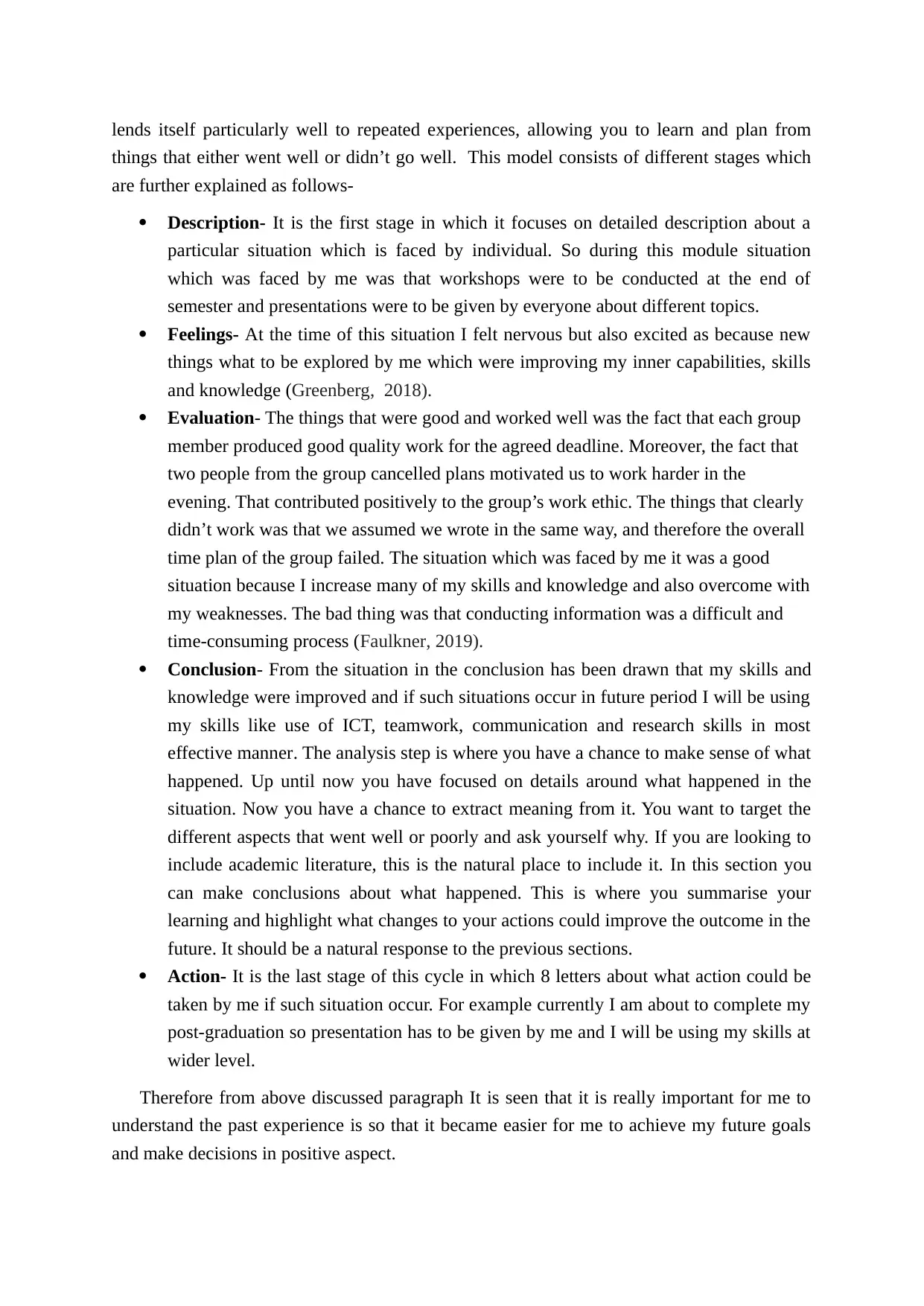
lends itself particularly well to repeated experiences, allowing you to learn and plan from
things that either went well or didn’t go well. This model consists of different stages which
are further explained as follows-
Description- It is the first stage in which it focuses on detailed description about a
particular situation which is faced by individual. So during this module situation
which was faced by me was that workshops were to be conducted at the end of
semester and presentations were to be given by everyone about different topics.
Feelings- At the time of this situation I felt nervous but also excited as because new
things what to be explored by me which were improving my inner capabilities, skills
and knowledge (Greenberg, 2018).
Evaluation- The things that were good and worked well was the fact that each group
member produced good quality work for the agreed deadline. Moreover, the fact that
two people from the group cancelled plans motivated us to work harder in the
evening. That contributed positively to the group’s work ethic. The things that clearly
didn’t work was that we assumed we wrote in the same way, and therefore the overall
time plan of the group failed. The situation which was faced by me it was a good
situation because I increase many of my skills and knowledge and also overcome with
my weaknesses. The bad thing was that conducting information was a difficult and
time-consuming process (Faulkner, 2019).
Conclusion- From the situation in the conclusion has been drawn that my skills and
knowledge were improved and if such situations occur in future period I will be using
my skills like use of ICT, teamwork, communication and research skills in most
effective manner. The analysis step is where you have a chance to make sense of what
happened. Up until now you have focused on details around what happened in the
situation. Now you have a chance to extract meaning from it. You want to target the
different aspects that went well or poorly and ask yourself why. If you are looking to
include academic literature, this is the natural place to include it. In this section you
can make conclusions about what happened. This is where you summarise your
learning and highlight what changes to your actions could improve the outcome in the
future. It should be a natural response to the previous sections.
Action- It is the last stage of this cycle in which 8 letters about what action could be
taken by me if such situation occur. For example currently I am about to complete my
post-graduation so presentation has to be given by me and I will be using my skills at
wider level.
Therefore from above discussed paragraph It is seen that it is really important for me to
understand the past experience is so that it became easier for me to achieve my future goals
and make decisions in positive aspect.
things that either went well or didn’t go well. This model consists of different stages which
are further explained as follows-
Description- It is the first stage in which it focuses on detailed description about a
particular situation which is faced by individual. So during this module situation
which was faced by me was that workshops were to be conducted at the end of
semester and presentations were to be given by everyone about different topics.
Feelings- At the time of this situation I felt nervous but also excited as because new
things what to be explored by me which were improving my inner capabilities, skills
and knowledge (Greenberg, 2018).
Evaluation- The things that were good and worked well was the fact that each group
member produced good quality work for the agreed deadline. Moreover, the fact that
two people from the group cancelled plans motivated us to work harder in the
evening. That contributed positively to the group’s work ethic. The things that clearly
didn’t work was that we assumed we wrote in the same way, and therefore the overall
time plan of the group failed. The situation which was faced by me it was a good
situation because I increase many of my skills and knowledge and also overcome with
my weaknesses. The bad thing was that conducting information was a difficult and
time-consuming process (Faulkner, 2019).
Conclusion- From the situation in the conclusion has been drawn that my skills and
knowledge were improved and if such situations occur in future period I will be using
my skills like use of ICT, teamwork, communication and research skills in most
effective manner. The analysis step is where you have a chance to make sense of what
happened. Up until now you have focused on details around what happened in the
situation. Now you have a chance to extract meaning from it. You want to target the
different aspects that went well or poorly and ask yourself why. If you are looking to
include academic literature, this is the natural place to include it. In this section you
can make conclusions about what happened. This is where you summarise your
learning and highlight what changes to your actions could improve the outcome in the
future. It should be a natural response to the previous sections.
Action- It is the last stage of this cycle in which 8 letters about what action could be
taken by me if such situation occur. For example currently I am about to complete my
post-graduation so presentation has to be given by me and I will be using my skills at
wider level.
Therefore from above discussed paragraph It is seen that it is really important for me to
understand the past experience is so that it became easier for me to achieve my future goals
and make decisions in positive aspect.
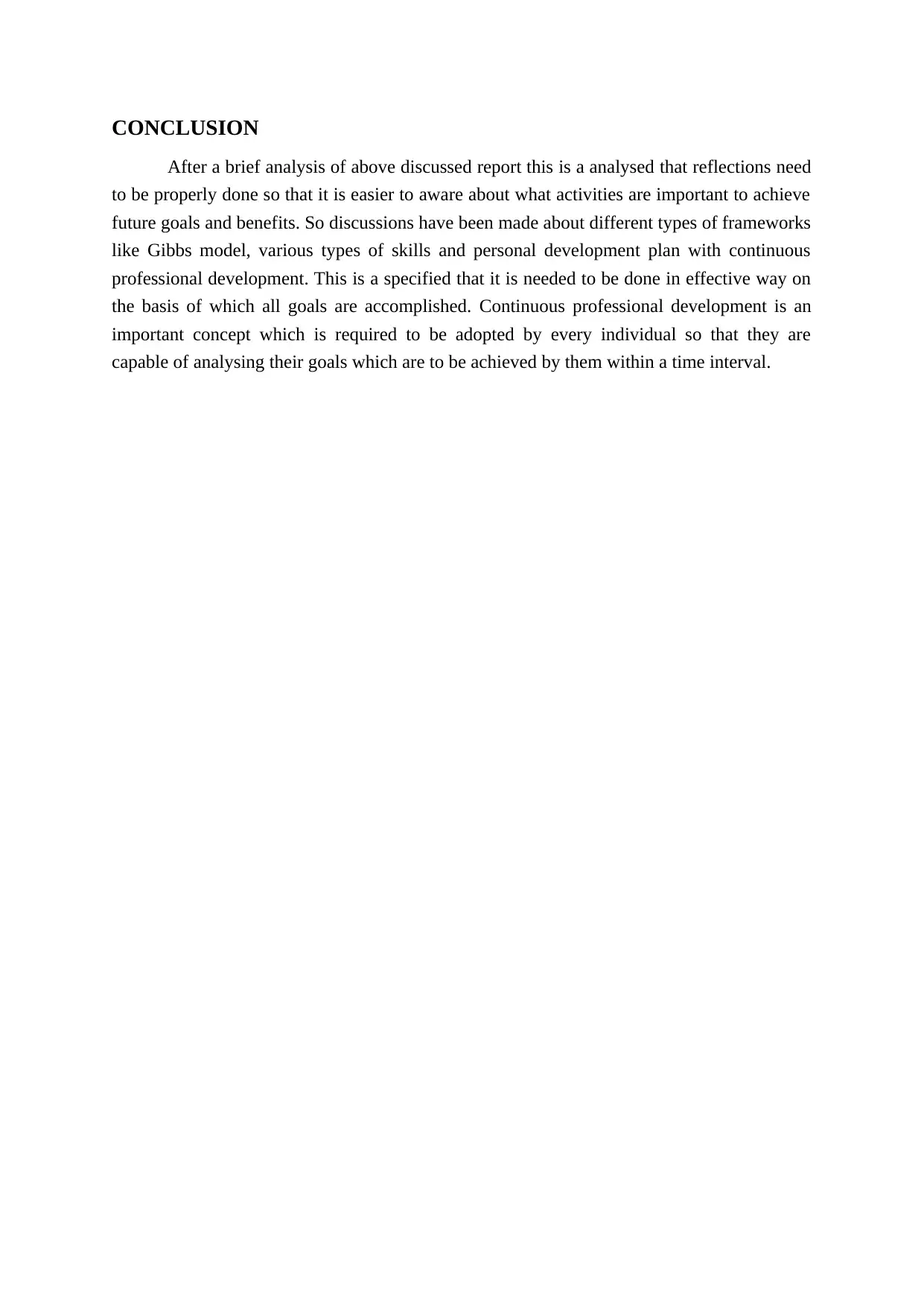
CONCLUSION
After a brief analysis of above discussed report this is a analysed that reflections need
to be properly done so that it is easier to aware about what activities are important to achieve
future goals and benefits. So discussions have been made about different types of frameworks
like Gibbs model, various types of skills and personal development plan with continuous
professional development. This is a specified that it is needed to be done in effective way on
the basis of which all goals are accomplished. Continuous professional development is an
important concept which is required to be adopted by every individual so that they are
capable of analysing their goals which are to be achieved by them within a time interval.
After a brief analysis of above discussed report this is a analysed that reflections need
to be properly done so that it is easier to aware about what activities are important to achieve
future goals and benefits. So discussions have been made about different types of frameworks
like Gibbs model, various types of skills and personal development plan with continuous
professional development. This is a specified that it is needed to be done in effective way on
the basis of which all goals are accomplished. Continuous professional development is an
important concept which is required to be adopted by every individual so that they are
capable of analysing their goals which are to be achieved by them within a time interval.
⊘ This is a preview!⊘
Do you want full access?
Subscribe today to unlock all pages.

Trusted by 1+ million students worldwide
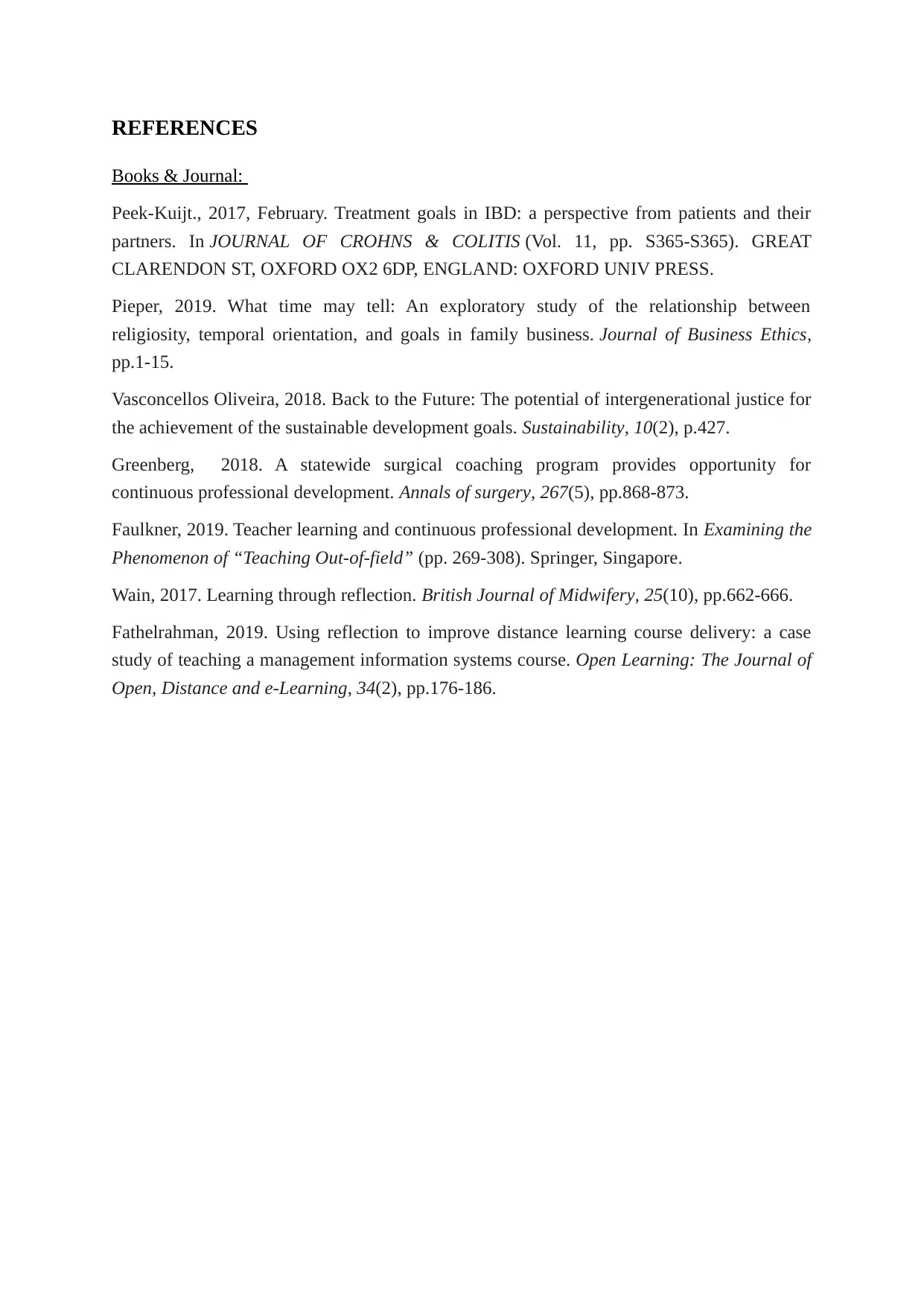
REFERENCES
Books & Journal:
Peek-Kuijt., 2017, February. Treatment goals in IBD: a perspective from patients and their
partners. In JOURNAL OF CROHNS & COLITIS (Vol. 11, pp. S365-S365). GREAT
CLARENDON ST, OXFORD OX2 6DP, ENGLAND: OXFORD UNIV PRESS.
Pieper, 2019. What time may tell: An exploratory study of the relationship between
religiosity, temporal orientation, and goals in family business. Journal of Business Ethics,
pp.1-15.
Vasconcellos Oliveira, 2018. Back to the Future: The potential of intergenerational justice for
the achievement of the sustainable development goals. Sustainability, 10(2), p.427.
Greenberg, 2018. A statewide surgical coaching program provides opportunity for
continuous professional development. Annals of surgery, 267(5), pp.868-873.
Faulkner, 2019. Teacher learning and continuous professional development. In Examining the
Phenomenon of “Teaching Out-of-field” (pp. 269-308). Springer, Singapore.
Wain, 2017. Learning through reflection. British Journal of Midwifery, 25(10), pp.662-666.
Fathelrahman, 2019. Using reflection to improve distance learning course delivery: a case
study of teaching a management information systems course. Open Learning: The Journal of
Open, Distance and e-Learning, 34(2), pp.176-186.
Books & Journal:
Peek-Kuijt., 2017, February. Treatment goals in IBD: a perspective from patients and their
partners. In JOURNAL OF CROHNS & COLITIS (Vol. 11, pp. S365-S365). GREAT
CLARENDON ST, OXFORD OX2 6DP, ENGLAND: OXFORD UNIV PRESS.
Pieper, 2019. What time may tell: An exploratory study of the relationship between
religiosity, temporal orientation, and goals in family business. Journal of Business Ethics,
pp.1-15.
Vasconcellos Oliveira, 2018. Back to the Future: The potential of intergenerational justice for
the achievement of the sustainable development goals. Sustainability, 10(2), p.427.
Greenberg, 2018. A statewide surgical coaching program provides opportunity for
continuous professional development. Annals of surgery, 267(5), pp.868-873.
Faulkner, 2019. Teacher learning and continuous professional development. In Examining the
Phenomenon of “Teaching Out-of-field” (pp. 269-308). Springer, Singapore.
Wain, 2017. Learning through reflection. British Journal of Midwifery, 25(10), pp.662-666.
Fathelrahman, 2019. Using reflection to improve distance learning course delivery: a case
study of teaching a management information systems course. Open Learning: The Journal of
Open, Distance and e-Learning, 34(2), pp.176-186.
Paraphrase This Document
Need a fresh take? Get an instant paraphrase of this document with our AI Paraphraser

1 out of 8
Related Documents
Your All-in-One AI-Powered Toolkit for Academic Success.
+13062052269
info@desklib.com
Available 24*7 on WhatsApp / Email
![[object Object]](/_next/static/media/star-bottom.7253800d.svg)
Unlock your academic potential
Copyright © 2020–2026 A2Z Services. All Rights Reserved. Developed and managed by ZUCOL.




